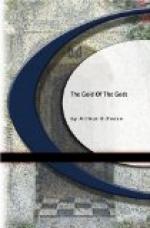It took me, as I knew it would, considerably over a couple of hours to clear things up at the Star, so that I could take advantage of a special arrangement which I had made, so that I could, when a case warranted it, co-operate with Kennedy. My story was necessarily brief, but that was what I wanted just now. I did not propose to have the whole field of special-feature writers camping on my preserve.
Uptown I hurried again, afraid that Kennedy had finished and might have been called away. But when I reached the laboratory he was not there, and I found that he had not been. Up and down I paced restlessly. There was nothing else to do but wait. If he was unable to keep his appointment here with me, I knew that he would soon telephone. What was it, I wondered, that kept him delving into the archaeological lore of the library?
I had about given him up, when he hurried into the laboratory in a high state of excitement.
“What did you find?” I queried. “Has anything happened?”
“Let me tell you first what I found in the library,” he replied, tilting his hat back on his head and alternately thrusting and withdrawing his fingers in his waistcoat pockets, as if in some way that might help him to piece together some scattered fragments of a story which he had just picked up.
“I’ve been looking up that hint that the Senorita dropped when she used those words peje grande, which mean, literally, ‘big fish,’” he resumed. “Walter, it fires the imagination. You have read of the wealth that Pizarro found in Peru, of course.” Visions of Prescott flashed through my mind as he spoke.
“Well, where are the gold and silver of the conquistadores? Gone to the melting-pot, centuries ago. But is there none left? The Indians in Peru believe so, at any rate. And, Walter, there are persons who would stop at nothing to get at the secret.
“It is a matter of history that soon after the conquest a vast fortune was unearthed of which the King of Spain’s fifth amounted to five million dollars. That treasure was known as the peje chica—the little fish. One version of the story tells that an Inca ruler, the great Cacique Mansiche, had observed with particular attention the kindness of a young Spaniard toward the people of the conquered race. Also, he had observed that the man was comparatively poor. At any rate, he revealed the secret of the hiding-place of the peje chica, on condition that a part of the wealth should be used to advance the interests of the Indians.
“The most valuable article discovered was in the form of a fish of solid gold and so large that the Spaniards considered it a rare prize. But the Cacique assured his young friend that it was only the little fish, that a much greater treasure existed, worth many times the value of this one.




